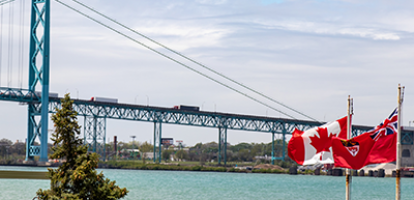From: Lawrence Herman
To: Trade watchers
Date: November 29, 2024
Re: Addressing the Lack of “National Security” in Canada’s Trade Laws
Key Canadian trade laws do not refer to “national security” as a factor that allows Canada to counter threats from imports of goods or services. Given the state of world affairs and the challenges Canada faces from aggressive players like China, Russia, Iran and others, this needs to be remedied immediately.
This omission matters most in the Customs Tariff Act (CTA) and the Export and Import Permits Act (EIPA), two of Canada’s most important sets of trade laws.
I propose ways to close this “national security gap.”
Tariffs and National Security
In the case of border measures, unlike the US, Canada lacks the legislative means to impose surcharges to protect national security. The closest we have is Section 53 of the Customs Tariff Act, which focuses on the enforcement of Canada’s rights under trade agreements and responses to practices that negatively affect Canadian trade. It was Section 53 that was used in the August decision to increase tariffs on Chinese electric vehicles.
The law is effective in that nothing inhibits rapid action by the federal cabinet to respond to foreign actions that breach their trade commitments to Canada. The critical shortcoming, on the other hand, is that while allowing the government to protect Canadian trade interests in a rapid fashion, Section 53 does not allow action on imports found to be threatening national security, whether it be economic, military or other. There is clearly a need to repair this omission.
Import Controls and National Security
Together with tariff measures, Canada can control imports under the EIPA through the creation of import (and export) control lists designed to achieve strategic, security and economic objectives.
These lists are established by orders-in-council, requiring listed goods and technology to have a permit in order to be imported or exported. These permits are issued by the Trade Controls and Technical Barriers Bureau in Global Affairs Canada. Without a permit, imports of controlled items are illegal.
While Section 5(1) of EIPA provides for the creation of import control lists covering arms, ammunition and military items, it fails to provide for imports of goods or technology to be controlled for national security reasons. The Act could not have been used, for example, to deal with the effects on national security of imports of Chinese EVs, steel, aluminum or any other goods or technology. EIPA is thus deficient in this regard.
EIPA needs to be amended to add this authority on the part of the government. Indeed, it may be desirable to re-consider much of the architecture of EIPA from the viewpoint of safeguarding Canada’s security interests on both the export and import side.
Sanctions and National Security
There is also a lack of reference to national security in Canada’s sanctions legislation, notably the Special Economic Measures Act (SEMA), the main Canadian sanctions statute. Amendments should be made to make security concerns a ground for imposing sanctions here as well.
The Multilateral Dimension
Chinese state capitalism and its centrally planned industrial capacity are geared toward dominating world markets in critical goods, part of that country’s geopolitical strategy. Given the state of affairs at the World Trade Organization, including the paralysis of its dispute settlement system, amendments to or reinterpretation of the GATT rules are difficult, if not impossible. The result is that governments will be resorting to unilateral application of the Article XXI exclusion in their own national security measures.
While the situation may evolve at the WTO, and without diminishing Canada’s support for the multilateral rules-based system, the federal government should bring forth measures to add reference to national security interests in the above statutes immediately.
Lawrence Herman, a former Canadian diplomat, is counsel at Herman & Associates and senior fellow of the C.D. Howe Institute in Toronto.
To send a comment or leave feedback, click here.
The views expressed here are those of the author. The C.D. Howe Institute does not take corporate positions on policy matters.





